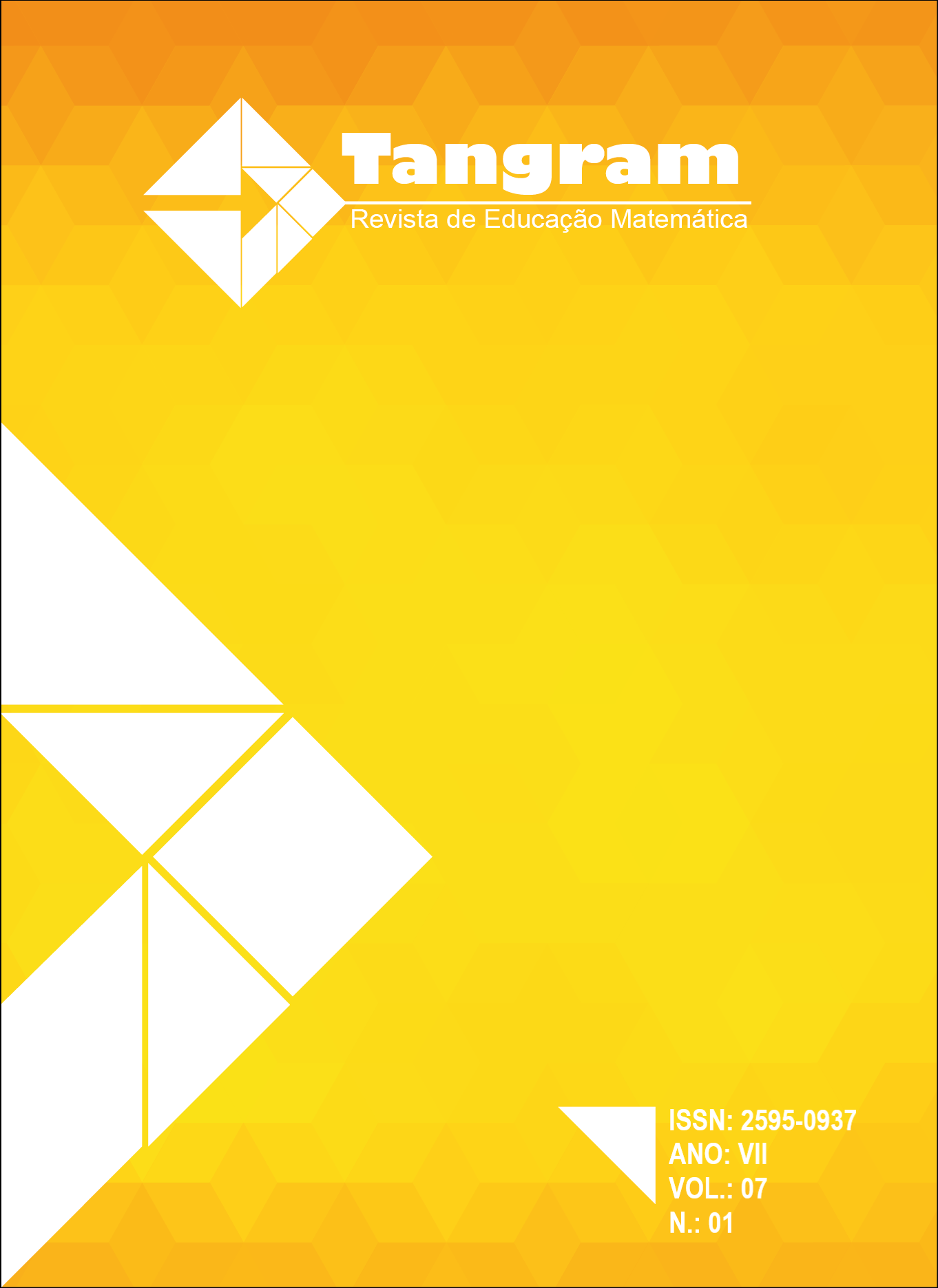Proposal for the Study of Fractal Patterns with Smartphone and Manipulable Materials
DOI:
https://doi.org/10.30612/tangram.v7i1.17606Keywords:
Interdisciplinarity, High School, GeoGebraAbstract
This article aims to discuss and share investigative activities for the study of fractals mediated by the smartphone and manipulable materials. The work was theoretically based on the Phases of Digital Technologies in Mathematics Education, arising from technological advances and how much they directly impact education. The investigation, of a qualitative nature, was carried out through the elaboration of activities for the study of fractals in an interdisciplinary and investigative way, available in the GeoGebra Book “Fractals: an experience with Mathematics and Art”. In this way, the research is justified by creating possibilities of working with fractals with the use of smartphones for didactic purposes, to serve as support for students and teachers interested in the subject. We conclude that the proposal to study fractal patterns through the smartphone allows mathematical learning to occur in conjunction with digital technologies, favoring the practice of investigative mathematics.
Downloads
References
Borba, M. C.; Scucuglia, R. R. S.; Gadanidis, G. (2014). Fases das Tecnologias Digitais em Educação Matemática: sala de aula e internet em movimento. Autêntica Editora. Belo Horizonte, MG, Brasil.
Borba, M. C.; Souto, D. L. P.; Canedo-Junior, N. R. C. (2022). Vídeos na educação matemática: Paulo Freire e a quinta fase das tecnologias digitais. Autêntica Editora. Belo Horizonte, MG, Brasil.
Barbosa, A. M. (2008). Inquietações e mudanças no ensino da arte. 5 ed. Cortêz Editora. São Paulo, SP, Brasil.
Faria, R. W. S. (2012). Padrões fractais: contribuições ao processo de generalização de conteúdos matemáticos. 195 f. Dissertação - (mestrado em Educação Matemática) - Universidade Estadual Paulista, Instituto de Geociências e Ciências Exatas. Rio Claro, SP, Brasil.
Faria, R. W. S. C.; Maltempi, M. V. (2012). Padrões Fractais: Conectando Matemática e Arte. Eccos Revista Científica (Impresso), v. 1, p. 33-53. São Paulo, SP, Brasil.
Guedes, T. M. R. (2023). Contribuições Interdisciplinares da Exploração Estética dos Padrões Fractais. Dissertação - (mestrado em Educação) - Universidade Federal de Viçosa. Viçosa, MG, Brasil.
Gouvea, F. R.; Murari, C. (2004). Fractais de bases caleidoscópicas. Encontro Nacional de Educação Matemática. Recife, PE, Brasil.
Paviani, J. (2008). Interdisciplinaridade: conceitos e distinções. 2. Ed. EDUCS. Caxias do Sul, RS, Brasil.
ROQUE. R. D. (2023). Padrões Fractais, Tecnologias Digitais e Interdisciplinaridade. Relatório de Iniciação Científica. Universidade Federal de Viçosa. Departamento de Matemática.
Vale, I.; Palhares, P.; Cabrita, I.; Borralho, A. (2007). Os Padrões no Ensino e Aprendizagem de Álgebra. Em I. Vale, T. Pimentel, A. Barbosa, L. Fonseca, L. Santos e P. Canavarro (Orgs), Números e Álgebra (p. 193-211). SEM-SPCE. Lisboa, Portugal.
Downloads
Published
How to Cite
Issue
Section
License

This work is licensed under a Creative Commons Attribution-NonCommercial-ShareAlike 3.0 Unported License.
Authors must accept the publication rules when submitting the journal, as well as agree to the following terms:
(a) The Editorial Board reserves the right to make changes to the Portuguese language in the originals to maintain the cultured standard of the language, while respecting the style of the authors.
(b) Authors retain the copyright and grant the journal the right to first publication, with the work simultaneously licensed under the Attribution-NonCommercial-ShareAlike 3.0 Brazil (CC BY-NC-SA 3.0 BR) that allows: Share - copy and redistribute the material in any medium or format and Adapt - remix, transform, and create from the material. CC BY-NC-SA 3.0 BR considers the following terms:
- Attribution - You must give the appropriate credit, provide a link to the license and indicate whether changes have been made. You must do so under any reasonable circumstances, but in no way that would suggest that the licensor supports you or your use.
- NonCommercial - You may not use the material for commercial purposes.
- Sharing - If you remix, transform, or create from material, you must distribute your contributions under the same license as the original.
- No additional restrictions - You may not apply legal terms or technological measures that legally restrict others from doing anything that the license permits.
(c) After publication, authors are allowed and encouraged to publish and distribute their work online - in institutional repositories, personal page, social network or other scientific dissemination sites, as long as the publication is not for commercial purposes.






